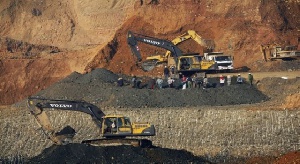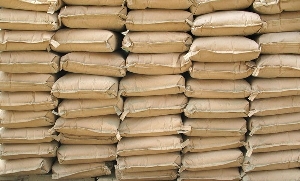- Home - News
- TWI News | TV
- Polls
- Year In Review
- News Archive
- Crime & Punishment
- Politics
- Regional
- Editorial
- Health
- Ghanaians Abroad
- Tabloid
- Africa
- Religion
- Election 2020
- Coronavirus
- News Videos | TV
- Photo Archives
- News Headlines
- Press Release
Business News of Sunday, 16 November 2014
Source: GNA
Forum on mining revenue ends in Accra
Representatives of government, civil society organisations, mining communities, and industry have engaged in a discussion on how mining revenue could be managed.
The dialogue is the first of its kind in three public private dialogues on mining governance led by the African Centre for Economic Transformation with the support of Australia.
Major concerns discussed focused on how mining revenues policies are made and implemented, as well as the standard of accountability and disclosure in the management of mineral resources and how they contribute to wider development.
Speaking on the topic: “Governance in the Management of Revenue from Mineral Exploitation,” Australia’s High Commissioner, Ms Joanna Adamson said: “Raising and managing revenue well is crucial for …development.”
“At the same time, mining and fiscal policies, while protecting community and environmental interests, should also promote a sustainable mining industry which will, in turn, deliver more revenue,” she said.
According to her, Australia concluded some technical assistance this year, which helped build capacity in the large taxpayers’ office in the Ghana Revenue Authority.
The support, she noted helped to introduce new audit methodologies that delivered revenue for the government, and encouraged predictability and compliance for tax payers.
“On the government side, integration of data could be improved to help track revenue streams.”
Ms Adamson observed that citizens demand transparency of revenue collection and expenditure, meanwhile, communities directly affected by mining often ask for direct contributions from mining companies for development support, even though it is the formal responsibility of the government to promote health and education services.
She observed that the minerals development fund would be an important mechanism for distribution of mineral revenues and royalties from government and those communities directly affected by mining, as well as improve transparency.
Ms Adamson praised Ghana, on becoming the Extractives Industries Transparency Initiative (EITI) compliant in 2010, and therefore urged government to continue to compile and publish its report, adding: “Australia has been a leading supporting of the EITI at the global level.”
“Through the World Bank’s Governance and Partnership Facility, Australia also supported the establishment of Ghana’s Public Interest and Accountability Committee, which has been created by law as an independent body of civil society representatives to oversee the implementation of the Petroleum Revenue Management Act.
“Its annual reports help citizens’ understanding of oil revenues and their management,” Ms Adamson added.
“In Ghana, Australia is working with the International Mining for Development Centre and the University of Western Australia to support the University of Ghana Facility of Law to develop a short course on Mining law and policy. This is intended for government, private sector and civil society organisations.”
She said Ghana’s mineral resources offer significant and unparalleled opportunity for transforming the economy.
“If they are well managed and be translated into sustainable, equitable development for the people of Ghana,” Ms Adamson said.
Dr Mohammed Amin Adam, Executive Director of the Africa Centre for Energy Policy highlighted the challenge of mineral revenue management, sharing formula between the central government, local authorities and communities.
The current sharing arrangement, he said, allows statutory earmarking of mineral revenues.
He said 80 per cent of the total mineral revenues received by government are shared between the central government and 20 per cent to impact communities and mineral agencies.
The total ceded revenue for distribution to communities is therefore transferred to the Mineral Development Fund and distributed.
He said, however, there are a number of factors that challenge the fiscal arrangements between the Central government and local communities, and the overall management of mineral revenues.
“At the community level, they include the inappropriateness of the application of the formula for emerging mining communities in the north the fairness of the formula for sharing benefits to communities; and the lack of a comprehensive law for guiding the utilisation of ceded mineral revenues.
“At the national level, there are equally serious challenges such as tracking mineral revenues through the budget due to funding ability, lack of an instrument for smoothing spending when commodity prices fluctuate; and the lack of a framework for meeting intergenerational equity objectives,” he said.
Dr Kwabena Donkor, Chairman of Parliamentary Committee of Mines and Energy, opposed to laws that leads to earmarking of revenues in Ghana, and said: “If we want to continue with the earmarking of mineral revenue, then what should be done is to state clearly what want to be done,” saying more than 100 years “we can’t prove the result of earmarking, so why then should we continue with that”?
Dr Donkor claimed some state institutions are engaged in illegal mining saying: “The constitution is so clear about it, but companies go into mining and are mining for several years without parliamentary ratification.”
“Example of such companies is Newmont; engaging with the biggest illegal mining in Akyem without parliamentary ratification.
“It’s not only Newmont who is engaged with this illegal mining, but there are several mining companies who are mining without parliamentary ratification.
“Right from the Mineral Commission, to parliament and Newmont are all guilty. This is not an issue of government, but an issue of the Ghanaian state; therefore, people of Ghana must sit up, because the malice is not of political servants, but public servants,” he added.











